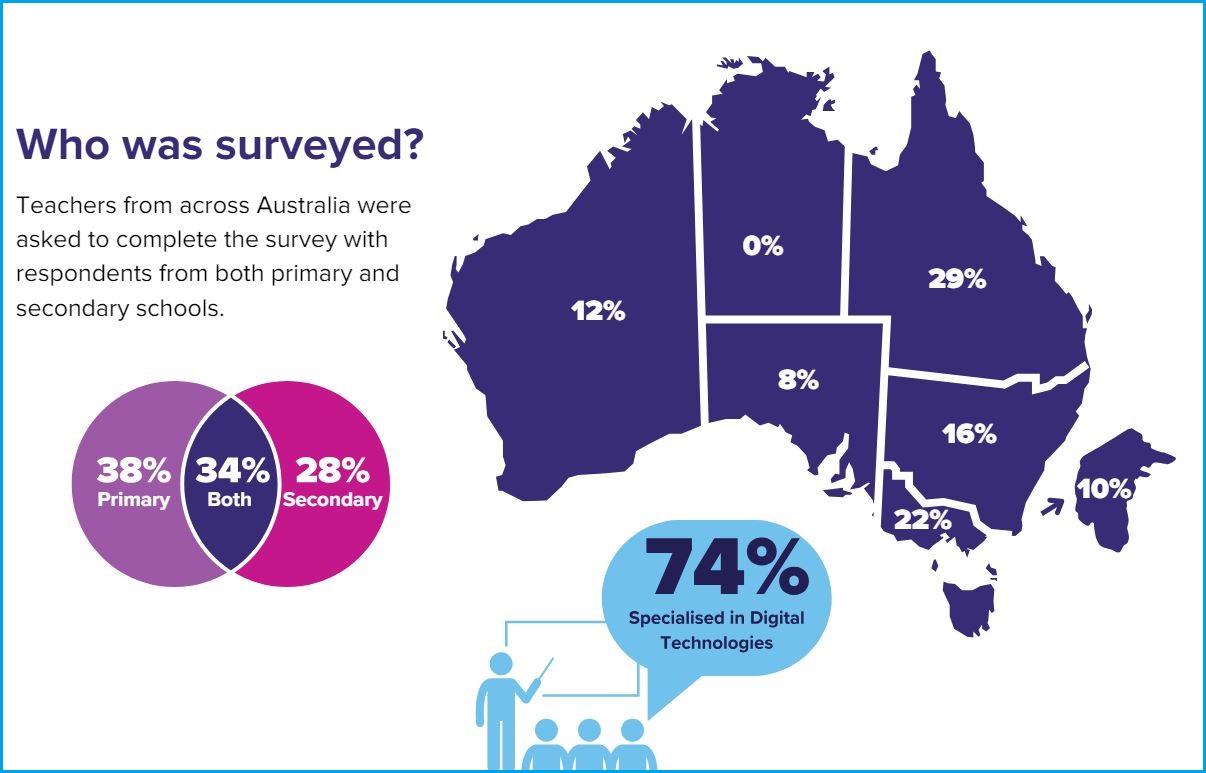Most primary and secondary Australian educators teaching technology subjects believe they do not receive enough support to teach the nation's Digital Technologies Curriculum (DTC), according to a recent survey.
The 'Tech skills for the next generation' report released by ACS (the publisher of Information Age) and the Australian National University's Tech Policy Centre found two-thirds of teachers faced challenges delivering the curriculum, while 72 per cent felt they did not receive enough support.
The peer-reviewed report was based on a survey of 218 secondary and primary teachers in government, Catholic and independent schools between July and October 2023, mostly in major cities.
It found the most common barrier to teaching the DTC was teachers’ limited knowledge of the curriculum (reported by 19 per cent), followed by limited resources and equipment (17 per cent) and a lack of experience or expertise (16 per cent).
At least 56 per cent of teachers had also not completed some form of professional development for the DTC in the latest school year, the survey found.
Of those who had completed some professional development, only a third said they had completed enough of it.
Most teachers said they developed their own DTC lesson plans, with more than 85 per cent saying it was difficult to find and use existing lesson plans and content.
The report made 11 recommendations, including better supporting teacher training and making teaching resources more accessible for the DTC, which was introduced by the federal government in 2014.
It also pointed to the importance of raising awareness about the importance of digital skills and the viability of technology careers, to encourage students to help fill the industry’s skills shortage.
Source: ANU & ACS 'Tech skills for the next generation' report
‘Opportunities are missed’
The report authors said teachers were often passionate about teaching the DTC but faced challenges in teaching students about it.
“Due to its relatively recent introduction, and rapidly evolving, sometimes highly technical content compared to more established subjects such as English and Mathematics, strategies and resources that teachers routinely apply to prepare lessons are not necessarily applicable, not available, or hard to access and find,” they said.
“While there is a national priority to increase Australia’s technology capabilities, there is little focus on the essential role of teachers in training and education of the next generation to build these capabilities.
“Consequently, support for teachers at the classroom level can be overlooked and opportunities to boost learning outcomes are missed.”
The report also pointed to decreasing numbers of students in years 11 and 12 taking up information and communications technology (ICT) subjects, and too few university graduates joining the sector to meet its projected workforce needs.
ACS’ 2023 Digital Pulse report found Australia would need an extra 205,000 to 237,000 technical workers by 2030 to be at the forefront of current technological trends.
The latest survey of teachers found 17 per cent believed their school had not promoted ICT career pathways to students.
Only 9 per cent said their school had seen an increase in year 12 students choosing technology or computer-based subjects, while 22 per cent said such subjects were not offered at all.
In those elective technology classes, most had a majority male cohort.
Source: ANU & ACS 'Tech skills for the next generation' report
'Australia risks falling short’
The report’s 11 recommendations were “developed, tested and refined” by the ANU’s Tech Policy Design Centre with input from education sector experts, the authors said.
Centred around “teacher training, lesson planning resources, and raising awareness”, the recommendations suggested how teachers of digital technologies could be better supported over the next five years.
“The goal is to better engage young Australians in digital technologies through their school years,” the authors said.
“This will equip them with the essential digital technology capabilities for their future participation in society and encourage more young people to pursue technology-related careers.
“Without action, Australia risks falling short of our future workforce needs and leaving our next generation ill-equipped for the future.”
The recommendations encouraged the federal government to make sure more teachers had access to teaching modules through the online Digital Technologies Hub, and said all governments — including states and territories — should better promote and invest in teacher training courses in software and digital technologies.
The authors said teachers needed to be supported to discuss emerging and disruptive technologies such as artificial intelligence and how they could best be utilised by students, and school leaders needed to “empower parents” to understand the value of technologies and technology careers.
Professor Johanna Weaver, founding director of the ANU Tech Policy Design Centre, said technology needed to be taught “as a fundamental skill set, like learning English and Maths”.
“The good news is there are policy levers that the federal and state governments can pull today to better support teachers,” she said.
“Without this support, we risk widening the digital divide and creating a society where the next generation of Australians are not equipped to navigate the increasingly complex digital world.”
The report authors also pushed for technological success to be recognised by school communities, and for greater inclusivity and visibility for underrepresented groups in STEM such as women and girls and First Nations peoples.
Sharon Singh, Chair of ACS’ ICT Educators Committee, said prioritising digital education was critical.
“Engaging students in digital technologies and empowering them as early as possible and throughout their school education can also lead to more Australians pursuing further education in technology fields and into technology-focused careers, helping them being part of Australia’s next-generation technology workforce,” she said.
ACS CEO Josh Griggs said that given the increasing importance of students’ digital skills, the report “gives policy makers and educators direction on effectively delivering the current curriculum and how we can continuously improve".
A previous survey released by ACS in 2022 also found a lack of digital skills training for teachers, and variations in the curriculum between schools and states.
That report’s 55 recommendations included the upskilling of all teachers, including all high school computer education teachers having some training in a programming language.
The 2024 report found there had been “little progress” in these issues "in part due to the impact of the COVID-19 pandemic”.












